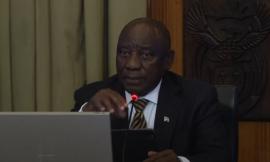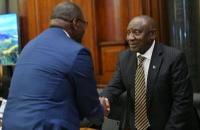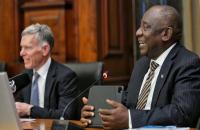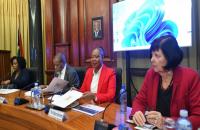
The government and business partnership to resolve South Africa’s challenges is beginning to bear fruit, although much more needs to be done.
This is according to a statement released by the Presidency and Business for South Africa.
The partnership between the two parties was established last year in a bid to work together to resolve the question of inclusive and economic growth.
The collaboration has targeted three areas for particular interest, including energy, transport and logistics, and crime and corruption.
PHOTOS | President Ramaphosa meets with business leaders at the Union Buildings
 |
 |
 |
Energy
In a joint statement following a meeting between government and business, which was led by President Cyril Ramaphosa on Tuesday, the Presidency and Business for South Africa noted that the energy workstream, in particular, has achieved significant progress.
“The energy workstream was reported to have had the most impact, achieving a dramatic reduction in load shedding, in collaboration with Eskom (over 140 days without load shedding so far this year), and significant grid capacity recovery (with more than 6 gigawatts of new energy generation added) through investment in additional technical support and capacitation from 57 companies investing over 9 000 hours at five power stations. The energy availability factor is currently tracking above 60% vs 54% in 2023.
READ | A further 2 500MW expected back 'by the end of August'
“However, we still face multiple challenges, including rapidly rising electricity costs, unsustainable municipal utilities, complex market reform, a constrained grid with delayed expansion, and stalling investment in new generation.
“Significant investment will be required for the energy sector reform over the next five to 10 years, and there was strong consensus that it is critical to pave the way now to address the challenges.
"Business, Eskom and the Presidency have agreed that the priorities of the National Energy Crisis Committee should include a focus on transmission, market reform, municipal utilities and new energy generation,” the statement read.
WATCH | Government, business meet with the President
|
|
Transport and logistics
In the statement, the two parties acknowledged that although the two workstreams have recorded successes, this was not “as quickly or extensively as anticipated”.
“Business has provided significant technical support and resources to Transnet Freight Rail, including procurement and operations expertise, and port maintenance support for Transnet Port Terminals. The Transnet Board and management team are making progress in implementing the Transnet recovery plan.
“Despite the significant efforts by the partners, there is broad acknowledgment that Transnet requires substantial interventions to improve performance to meet the needs of its customers and the market demand necessary for sustainable economic growth,” the statement read.
READ | Transnet forging ahead with reforms
An agreement was reached to move quickly to implement reforms and meet Freight Logistics Roadmap deadlines.
“The meeting agreed that the rapid implementation of structural reforms and strict adherence to the Freight Logistics Roadmap deadlines are crucial to facilitate the participation of and investment by the private sector to help address our national logistics challenges.
“This is crucial to ensure that our commodities and manufactured products can be competitively sold into the local market and exported to meet demand. Resolving these issues will promote job retention and job creation,” the joint statement said.
Crime and corruption
Critical to South Africa’s growth and investment prospects is removal from the Financial Action Task Force (FATF) grey list.
When the FATF grey listed South Africa at its February 2023 Plenary meetings, it adopted a jointly agreed Action Plan containing 22 Action Items linked to the eight strategic deficiencies identified in the country’s Anti-Money Laundering and the Combating of the Financing of Terrorism (AML/CFT) regime.
READ | SA continues work to exit grey list
The joint statement said the meeting agreed that an “immediate joint imperative" is to support South Africa’s removal from the list.
“Key to this is demonstrating the law enforcement agencies’ intent and ability to successfully prosecute complex crime and corruption cases, and recover assets. Business is providing specialised skills at arm’s length to support this objective.
"The promulgation of the NPA Amendment Act is key to bolstering the ability of the IDAC [Investigating Directorate Against Corruption] to effectively deliver on its mandate,” the statement said.
On job creation, the meeting acknowledged that growing the economy is imperative to facilitate employment opportunities.
“For now, unlocking a few key policy, regulatory and funding bottlenecks could accelerate existing short-term interventions across four areas, including new work opportunities in tourism and global business services; skilling that creates new jobs (particularly in digital skills); providing additional public sector first loss funding to crowd in private sector capital to increase affordable debt available for SMMEs, and institutionalising, expanding and strengthening the SAYouth platform to facilitate access to opportunities for young people,” the joint statement said. – SAnews.gov.za


